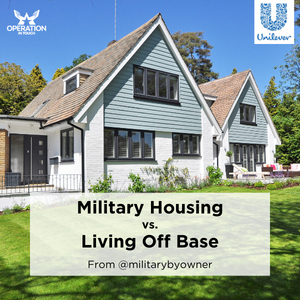
Military Housing Vs. Living Off Base
Living in Military Housing
Living on base in military housing is a unique experience of its own. There’s no better way to immerse yourself into the military lifestyle. The pros and cons fluctuate from one duty station to the next. And while some families love it, others don’t.
1) The financial aspect is covered.
When you live in privatized military housing, your Basic Housing Allowance (BAH) covers the cost of rent and utilities each month.
2) The tight-knit military community.
The military is known for its strong, supportive community. There’s something special about meeting people that you may otherwise have had nothing in common with and connecting with them.
3) Convenience to base amenities.
Living on base puts you in close proximity to everything you need like the commissary, exchange, health clinic/hospital, gym, lawyer, chapel, counseling, mechanic, and gas.
4) More bang for your buck.
Depending on where you live, it’s possible that military housing has more to offer you than living out in town. Take Hawaii, for example. Outside Marine Corps Base Hawaii (MCBH), the cost of living is high.
Drawbacks of Military Housing
1)The lack of privacy.
The military community is small. The military housing community is even smaller. Some privatized housing communities are almost comparable to living on campus for school..
2) The few housing options.
Many military installations are old, which means many of the housing options on base are also…old. If not recently updated, you could end up living in a less-than-ideal home.
3) Detachment from the local community.
When you live on base, and everything you need is within a small community around you, it becomes more challenging to be a part of the community outside of the base.
Perks of Living Off Base
1) Distance from military life.
Living off base provides some space from the military community. It doesn’t take away your option to participate in activities on base, but it allows you to have local neighbors and make relationships with people who don’t share an affiliation with the military.
2) The potential to save money.
Base housing (with a few exceptions) takes all of your BAH. If you choose to live off base, it might be possible to save money by finding a home well within or under your housing allowance.
3) A broader selection of housing options.
Not only do you get to choose which part of town suits your needs best, but you can choose your amenities too.
4) The option to buy a home.
You can’t buy into privatized military housing. But if you choose to live off the installation, the door to investing in real estate is wide open.
Drawbacks of Living Off Base
1) All the bills.
Unlike living on base, which includes your necessities, living off base requires you to set up service to your home independently. Water, electricity, gas, and trash need to be set up and paid on time each month- and remember to cancel them when you face a PCS.
2) A longer commute for the service member.
Living further from work means a longer commute in the car and less time at home.
3) The landlord/tenant relationship.
On-base housing is managed by privatized companies. They’ve streamlined the process for maintenance requests and communication. But when you live off base, aside from established communities, you’ll develop a personal one-on-one relationship with your landlord. Sometimes this is good. Sometimes it’s bad. Whether they’re overbearing or fail to communicate and fix issues within the home, a bad landlord can make your rental time miserable. It’s a risk you take when you choose to live off base.
One thing’s for sure: there’s no right or wrong answer to whether you should live on or off base. Each option comes with its own perks and downfalls. The important thing for you is to weigh the pros and cons and get a feel for your location because often, that’s the biggest factor in making the decision.


